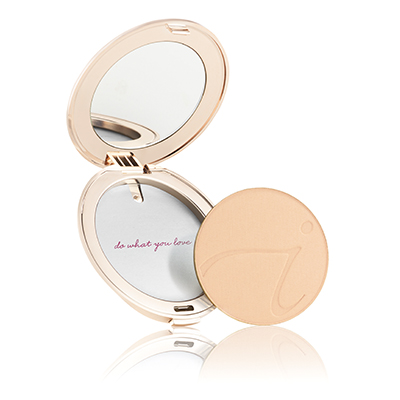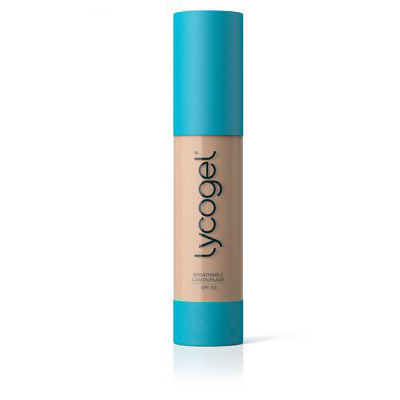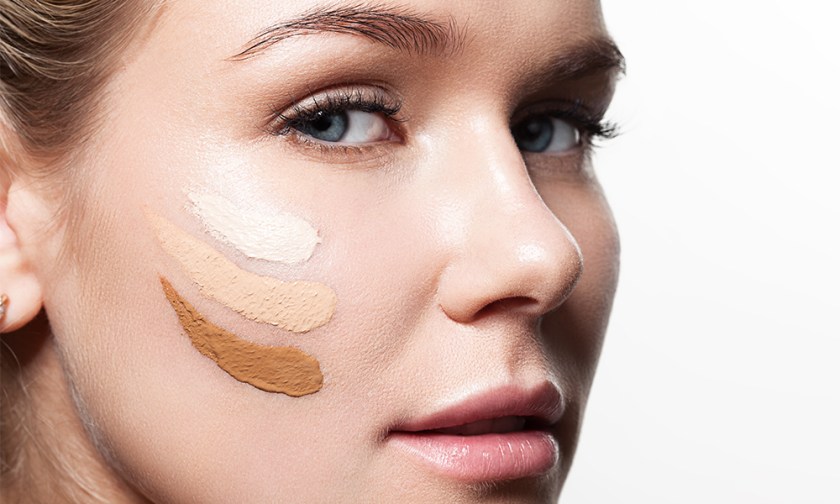If you’re an aesthetician working in a medi-clinic, promoting colour makeup to your clients might be low on your priority list.
Yet injecting a range makeup into your retail offering may not only boost the bottom line of your biz, but bolster the morale of your clients.
It comes down to choosing products that complement the type of treatments you offer and address the collective concerns of your client base.
While aesthetic treatments were once predominantly about pampering clients and making them feel good, there’s been a shift toward medi-aesthetics in recent years.
Beauty therapists are responding to the trend by extending their education and studying the bachelor degree in dermal sciences and other advanced diplomas needed to become a dermal clinical therapist equipped to perform non-surgical medi treatments. We note some of the most popular courses in Australia of this nature at the foot of the article.*
(A dermal clinician is trained to non-surgically address acute and chronic skin conditions, disorders and diseases. They’re also extensively educated in the relationship between skin health and the lymphatic, cardiovascular and endocrine systems.)
Medi-spas are dedicated to improving the look, feel and health of the skin, and this is why they can benefit from retailing a makeup collection as much as a salon.
Match Your Makeup Offering To Your Client Needs
“You need to know who your target market is and why they’re coming to see you,” advises Sydney dermal therapist, Sarah Hudson, who “cherry picked” from several makeup brands when selecting makeup for her clinic, Skin By Sarah Hudson in Beecroft, Sydney.
“I only choose the pieces from a makeup range that are appropriate to our clients concerns. We see a lot of people who have breakouts, and in some cases their it’s their makeup that’s causing the problem. I knew we needed a base and a mineral blush that were non irritating, non-comodogenic (ie. did not clog pores).
“Other clients are most concerned about ageing, and as they’ve aged the may have lost confidence in their makeup techniques. We only stock what’s necessary – a really good lip liner so they can shape their lips. And as eyes can become more irritated with age, we also stock a mascara that’s non-irritating and non-smudging. We are also looking at getting in an anti-ageing treatment foundation.
“We don’t have a large range, and only stock what’s necessary, but because our offering is just right for our target market, the makeup products are some of the biggest sellers at the clinic.”
Your Makeup Offering Should Suit Your Treatments
A cross section of businesses can fall under the umbrella of medi-clinic – from doctor-led practices to injecting clinics, to spas that specialise in non-invasive procedures, too, such as laser, IPL, peels, skin-needling and infrared treatments.
Jane Iredale Makeup, a one of the first non-toxic, professional-grade, pure mineral cosmetics to hit the market, launched in 1994.
Jacqui Hollins brand manager explains how important makeup choices are, immediately post-procedure:
“When the superficial layer of the skin has been compromised or opened after a cosmetic procedure, such as collagen induction therapy and laser resurfacing, the skin is at its most sensitive and can present with redness, swelling and heat.
“It is therefore best to avoid traditional or conventional makeup brands which may exacerbate these symptoms due to their inclusion of highly sensitising ingredients such as synthetic fragrances, petroleum, chemical dyes, parabens and talc.
“These ingredients can cause skin to itch and burn, which in turn can increase erythema. Most importantly, product fillers such as talc – which make up 70-80% of conventional makeup – do not allow the skin to breathe. These ingredients are occlusive, dehydrating and inhibit the skin’s natural healing process.”
Matt Williams, director of Professional Beauty Solutions, says that makeup stocked in-clinic should be suitable to be applied on the client by the therapist post-procedure. By gently concealing the signs of compromised skin, it minimises downtime and the client walks out feeling confident.
“The formula should support the post-procedure healing process, it should not irritate or clog fragile skin. Therefore the last thing clients should be doing is using mass-produced, chemical-filled cosmetic products from the supermarket, department store or pharmacy,” he notes.
It’s therefore very important that the makeup stocked should complement the type of procedures on offer. We explore some of the formulas that are most-loved by medi-aesthetic practices:
Paramedical Perfection

Whether you’re a cosmetic doctor, registered nurse or dermal clinician working in aesthetics, you are performing technical procedures using medical-grade equipment so it’s easy to understand why paramedical makeup is popular among their respective clinics.
“Paramedical makeup is a term used to describe a makeup line that can be used post treatment to camouflage erythema associated with skin conditions and cosmetic procedures,” says Jacqui.
“We fit this category not only because of the clean formulas, comprehensive product testing and high colour pay-off, but also due to natural SPF ingredients like titanium dioxide and zinc oxide that both work to calm and soothe sensitised skin.
“It is essential to apply a product containing chemical-free, broad spectrum protection sunscreen post treatment because post-procedure skin may be more at risk to the harmful effects of the sun.
“Our makeup also contains pharmaceutical-grade vitamins, antioxidants and botanicals to help calm and soothe the skin, providing it with the best opportunity to naturally heal itself after invasive skin treatments.
“Ingredients such as pine bark, green tea, pomegranate and sea minerals are superior antioxidants which may help to speed up recovery time.”
Magic Mineral Makeup

Makeup made from only a few skin-safe mineral ingredients (such as zinc and titanium dioxide) is popular among medi-aesthetics practices.
Youngblood Minerals not only fits this profile but has a broad colour range of foundation. It’s a favourite among makeup artists and can create even the most dramatic looks.
According to Matt Williams, the range is safe to use straight after many non-surgical procedures.
Breathable Beauty

Lycogel breathable foundations were originally designed to be used by doctors post-procedure to counteract heat sensation and swelling and camouflage bruising or redness.
Whether the skin is compromised or completely healed, they are now a popular choice of everyday makeup suitable for a variety of types, including acneic, pigmented and sensitive.
The range boasts a comprehensive spread of shades and coverage options. Each is designed to deliver oxygen, moisture and nutrients via a breathable base.
Its manufacturers say it can be applied directly after any of the following procedures: fractional laser skin resurfacing, laser skin peels, cosmetic surgery, hair transplant surgery, scar revisions, tattoo removal, cosmetic injections, chemical and mechanical peels.
Extension of Skincare

Naturally, most medi-aesthetics practices opt for a results driven range when retailing skincare, so it’s not surprising that dedicated cosmeceutical collections like Australian brand O Cosmedics are commonly chosen.
The brand has recently released a treatment foundation designed to be an extension of their skincare.
“It is suitable to be worn post-skin peel or procedure, because of its clean formula that does not contain chemicals that disrupt the skin’s barrier or block the pores – so its free from talc, paragons, silicones, fragrance, petrochemicals, nano-ingredients and GMOs,” says Marie Cocciolone, who founded the brand in 2010.
“Our formulas’ ingredients are 98% natural with multi-functional anti-ageing actives that repair and hydrate the skin, support skin firmness and elasticity and collagen and elastin synthesis.”
Training and Prescribing Post-Procedure Makeup
Francesca Perino, owner of Mi:Skin Clinics in Perth, says that her clinics’ makeup range, Lycogel, is not only popular among clients, but interstate devotees who know she’s a stockist regularly call looking buy.
“All therapists at our clinic have been trained re the benefits of the product, and colour-matching, however, most advice about makeup and prescribing specific products is done by our dermal therapist when she is discussing home care or cleansing the clients,” she notes.
“Post-procedure, we offer all clients a makeup consultation with one of our practitioners,” says Claire Mason, founder of Integrity Paramedical Skin Practitioners, which has stocked Jane Iredale since early 2016.
“We like to take the time to complete our service, offer new colour options and looks and provide valuable tips to ensure everyone walks out feeling and looking great.
“From Day 1, our whole team has embraced the Jane Iredale concept. We have regular education days with our Queensland Jane Iredale business manager. We all know about and love the skin health benefits of the range, plus the wide variety of texture and colour options.
“Clients love the events we hold in our clinic for special offers or new products from the range and this all drives interest and an increase in revenue.”
Victorian medi-clinic The Skin Boutique has been stocking Jane Iredale since 2013. Clinic owner Vicki Moini says the range is an integral step after all skin procedures that leave the skin vulnerable, to protect it.
“Jane Iredale is recommended to all of our clients as it is superior makeup. It is introduced to the client on the first visit as it will give them the best possible results due to the quality ingredients,” she says.
“Our specialists are confident when being able to prescribe and recommend Jane Iredale to their clients knowing that they are going to have a beautiful finish and quality product that will cause no harm but also improve their skin.”
Victoria University – Currently the only institution in Australia that offers a bachelor level degree in dermal science. This course equips students with the knowledge and hands-on training to perform dermal treatments for more serious skin issues such as wounds, tattoo removal and psoriasis.
GRAY CLAY – Offers an extensive array of courses in aesthetic medicine. Their education philosophy hinges on practical, hands on training with campuses on the Gold Coast, QLD and in Melbourne Victoria. Programs include an advanced diploma of cosmetic dermal science and graduate diplomas in dermal therapies.
AACDS – The Australian Academy of Cosmetic Dermal Science is a registered training organisation with its head office located in Perth. The academy is co-joined with Aspire Medispa, offering a professional setting with medical supervision. Courses include an advanced diploma of cosmetic dermal science and graduate diploma of dermal therapies.
The French Beauty Academy is one of Australia’s largest beauty training organisations, renowned for grooming career-ready graduates that can practice with confidence anywhere in the world. In the realm of medi-aesthetics education, programs include an advanced diploma of dermal science and therapies.




